英语单词中的比较级
英语单词比较级
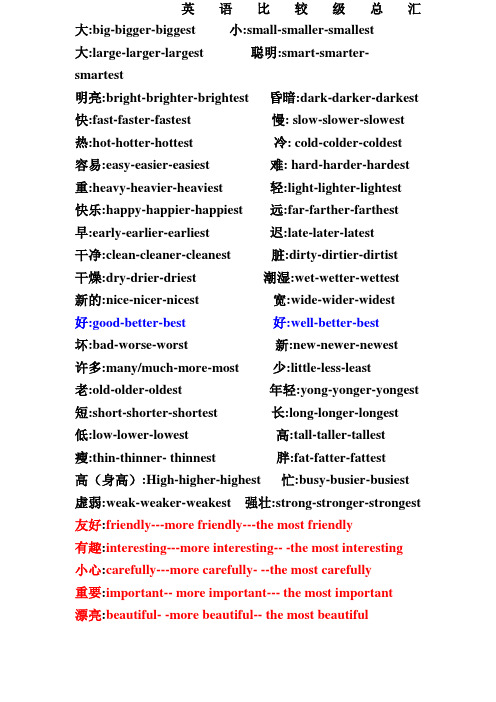
英语比较级总汇大:big-bigger-biggest 小:small-smaller-smallest大:large-larger-largest 聪明:smart-smarter- smartest明亮:bright-brighter-brightest 昏暗:dark-darker-darkest 快:fast-faster-fastest 慢: slow-slower-slowest 热:hot-hotter-hottest 冷: cold-colder-coldest容易:easy-easier-easiest 难: hard-harder-hardest 重:heavy-heavier-heaviest 轻:light-lighter-lightest快乐:happy-happier-happiest 远:far-farther-farthest 早:early-earlier-earliest 迟:late-later-latest干净:clean-cleaner-cleanest 脏:dirty-dirtier-dirtist干燥:dry-drier-driest 潮湿:wet-wetter-wettest新的:nice-nicer-nicest 宽:wide-wider-widest 好:good-better-best 好:well-better-best坏:bad-worse-worst 新:new-newer-newest许多:many/much-more-most 少:little-less-least老:old-older-oldest 年轻:yong-yonger-yongest 短:short-shorter-shortest 长:long-longer-longest 低:low-lower-lowest 高:tall-taller-tallest瘦:thin-thinner- thinnest 胖:fat-fatter-fattest高(身高):High-higher-highest 忙:busy-busier-busiest 虚弱:weak-weaker-weakest 强壮:strong-stronger-strongest 友好:friendly---more friendly---the most friendly有趣:interesting---more interesting-- -the most interesting小心:carefully---more carefully- --the most carefully重要:important-- more important--- the most important漂亮:beautiful- -more beautiful-- the most beautiful。
比较级双写加er的单词50个
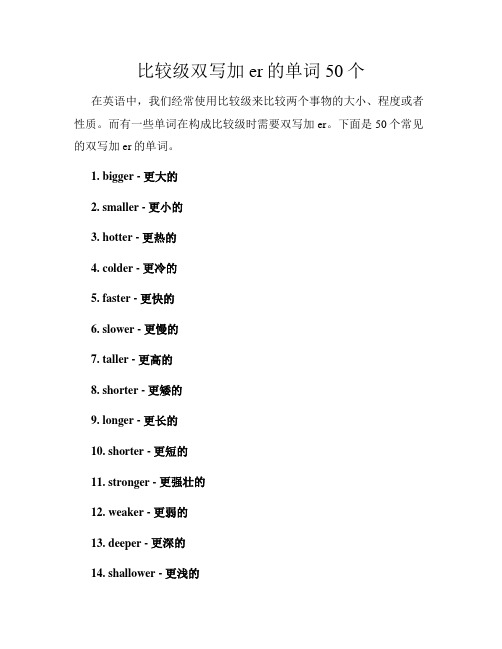
比较级双写加er的单词50个在英语中,我们经常使用比较级来比较两个事物的大小、程度或者性质。
而有一些单词在构成比较级时需要双写加er。
下面是50个常见的双写加er的单词。
1. bigger - 更大的2. smaller - 更小的3. hotter - 更热的4. colder - 更冷的5. faster - 更快的6. slower - 更慢的7. taller - 更高的8. shorter - 更矮的9. longer - 更长的10. shorter - 更短的11. stronger - 更强壮的12. weaker - 更弱的13. deeper - 更深的14. shallower - 更浅的16. narrower - 更窄的17. brighter - 更亮的18. darker - 更暗的19. louder - 更响亮的20. softer - 更柔软的21. happier - 更快乐的22. sadder - 更悲伤的23. angrier - 更生气的24. calmer - 更平静的25. busier - 更忙的26. lazier - 更懒的27. prettier - 更漂亮的28. uglier - 更丑的29. smarter - 更聪明的30. dumber - 更笨的31. crazier - 更疯狂的33. kinder - 更善良的34. meaner - 更刻薄的35. braver - 更勇敢的36. shyer - 更害羞的37. luckier - 更幸运的38. unluckier - 更不幸的39. richer - 更富有的40. poorer - 更贫穷的41. older - 更年长的42. younger - 更年轻的43. better - 更好的44. worse - 更糟的45. fatter - 更胖的46. thinner - 更瘦的47. lighter - 更轻的48. heavier - 更重的50. harder - 更困难的这些双写加er的单词在日常生活中经常被使用。
动词比较级的变化规则

动词比较级的变化规则动词比较级是英语中一个非常重要的语法结构,它用于比较两个或多个事物之间的程度、大小、高低等差异。
了解动词比较级的变化规则对于学习英语是非常重要的。
一般情况下,动词比较级的变化规则如下:1. 一般情况下,在动词原形后面加上-er,如:big-bigger, tall-taller, fast-faster。
2. 对于以一个元音字母加上一个辅音字母结尾的单词,需要双写最后一个辅音字母,并在后面加上-er,如:big-bigger, hot-hotter。
3. 对于以“e”结尾的单词,只需要在其末尾加上-r即可,如:large-larger, fine-finer。
4. 对于以“y”结尾的单词,如果前面是元音字母,则直接在末尾添加-r即可;如果前面是辅音字母,则将“y”改为“i”,再加上-er。
例如:play-player, happy-happier。
5. 有些单词不符合以上规则,需要进行不规则变化。
例如:good-better, bad-worse, far-further/farther。
除了以上几种情况外,还有一些特殊情况需要注意:1. 双音节及多音节词的比较级前面需要加上more,如:beautiful-more beautiful, expensive-more expensive。
2. 部分不规则动词的比较级变化需要记忆,如:come-came-come-become-became-become。
3. 有些单词只有最高级,没有比较级,如:perfect、unique、dead 等。
总之,在学习英语过程中,了解动词比较级的变化规则是非常重要的。
只有掌握了这些规则,才能更加准确地表达自己的意思,并更好地理解他人所说的话。
比较级最高级变化规则总结
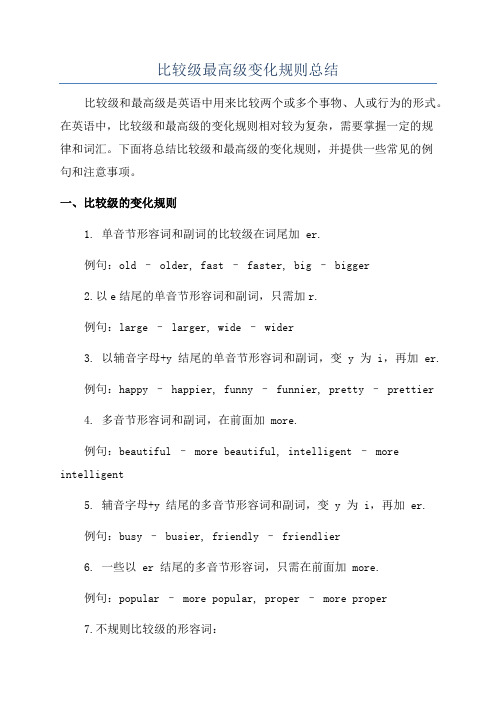
比较级最高级变化规则总结比较级和最高级是英语中用来比较两个或多个事物、人或行为的形式。
在英语中,比较级和最高级的变化规则相对较为复杂,需要掌握一定的规律和词汇。
下面将总结比较级和最高级的变化规则,并提供一些常见的例句和注意事项。
一、比较级的变化规则1. 单音节形容词和副词的比较级在词尾加 er.例句:old – older, fast – faster, big – bigger2.以e结尾的单音节形容词和副词,只需加r.例句:large – larger, wide – wider3. 以辅音字母+y 结尾的单音节形容词和副词,变 y 为 i,再加 er.例句:happy – happier, funny – funnier, pretty – prettier4. 多音节形容词和副词,在前面加 more.例句:beautiful – more beautiful, intelligent – more intelligent5. 辅音字母+y 结尾的多音节形容词和副词,变 y 为 i,再加 er.例句:busy – busier, friendly – friendlier6. 一些以 er 结尾的多音节形容词,只需在前面加 more.例句:popular – more popular, proper – more proper7.不规则比较级的形容词:多的:many – more, much – more少的:little –less, as/so … as二、最高级的变化规则1. 单音节形容词和副词的最高级在词尾加 est.例句:old – oldest, fast – fastest, big – biggest2. 以 e 结尾的单音节形容词和副词,只需加 st.例句:large – largest, wide – widest3. 以辅音字母+y 结尾的单音节形容词和副词,变 y 为 i,再加est.例句:happy – happiest, funny – funniest, pretty –prettiest4. 多音节形容词和副词,在前面加 most.例句:beautiful – most beautiful, intelligent – most intelligent5. 辅音字母+y 结尾的多音节形容词和副词,变 y 为 i,再加 est.例句:busy – busiest, friendly – friendliest6. 一些以 est 结尾的多音节形容词,只需在前面加 most.例句:popular – most popular, proper – most proper7.不规则最高级的形容词:多的:many – most, much – most少的:little – least三、注意事项1. 部分比较级和最高级形容词需要通过改变单词本身的拼写来变化。
形容词的比较级大全
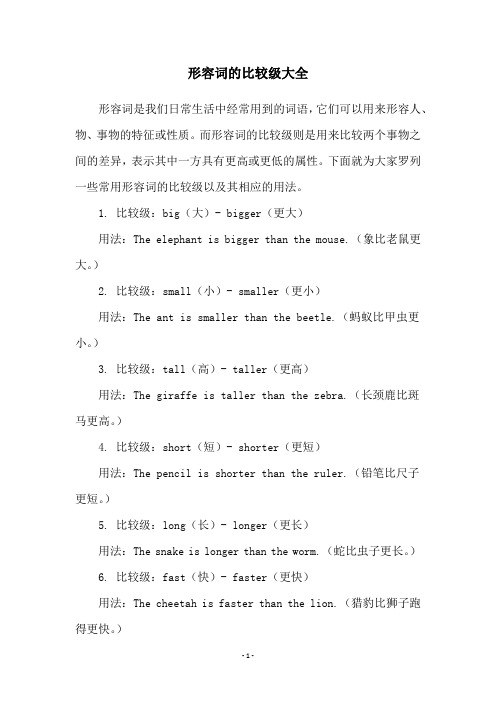
形容词的比较级大全形容词是我们日常生活中经常用到的词语,它们可以用来形容人、物、事物的特征或性质。
而形容词的比较级则是用来比较两个事物之间的差异,表示其中一方具有更高或更低的属性。
下面就为大家罗列一些常用形容词的比较级以及其相应的用法。
1. 比较级:big(大)- bigger(更大)用法:The elephant is bigger than the mouse.(象比老鼠更大。
)2. 比较级:small(小)- smaller(更小)用法:The ant is smaller than the beetle.(蚂蚁比甲虫更小。
)3. 比较级:tall(高)- taller(更高)用法:The giraffe is taller than the zebra.(长颈鹿比斑马更高。
)4. 比较级:short(短)- shorter(更短)用法:The pencil is shorter than the ruler.(铅笔比尺子更短。
)5. 比较级:long(长)- longer(更长)用法:The snake is longer than the worm.(蛇比虫子更长。
) 6. 比较级:fast(快)- faster(更快)用法:The cheetah is faster than the lion.(猎豹比狮子跑得更快。
)7. 比较级:slow(慢)- slower(更慢)用法:The turtle is slower than the rabbit.(乌龟比兔子跑得更慢。
)8. 比较级:easy(容易)- easier(更容易)用法:The multiple-choice test is easier than the essay test.(选择题比论述题更容易。
)9. 比较级:difficult(困难)- more difficult(更困难)用法:Calculus is more difficult than algebra.(微积分比代数更困难。
常见的比较级和最高级单词表
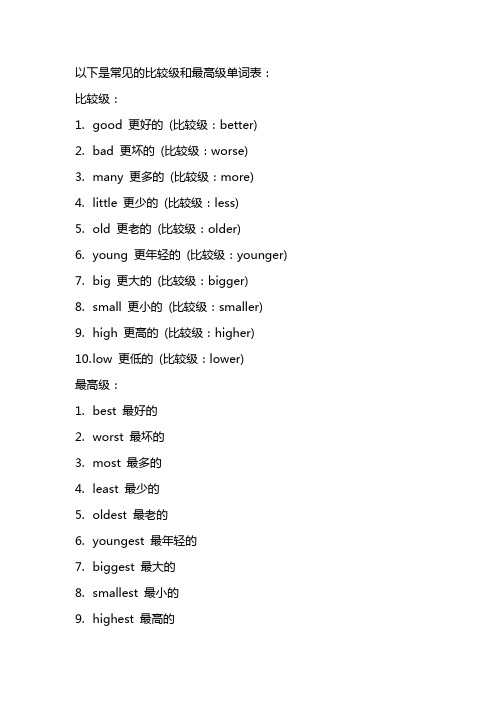
以下是常见的比较级和最高级单词表:
比较级:
1.good 更好的(比较级:better)
2.bad 更坏的(比较级:worse)
3.many 更多的(比较级:more)
4.little 更少的(比较级:less)
5.old 更老的(比较级:older)
6.young 更年轻的(比较级:younger)
7.big 更大的(比较级:bigger)
8.small 更小的(比较级:smaller)
9.high 更高的(比较级:higher)
10.low 更低的(比较级:lower)
最高级:
1.best 最好的
2.worst 最坏的
3.most 最多的
4.least 最少的
5.oldest 最老的
6.youngest 最年轻的
7.biggest 最大的
8.smallest 最小的
9.highest 最高的
10.lowest 最低的
需要注意的是,这些是比较常见的例子,实际上英语中还有很多其他的比较级和最高级形式。
比较级的书写
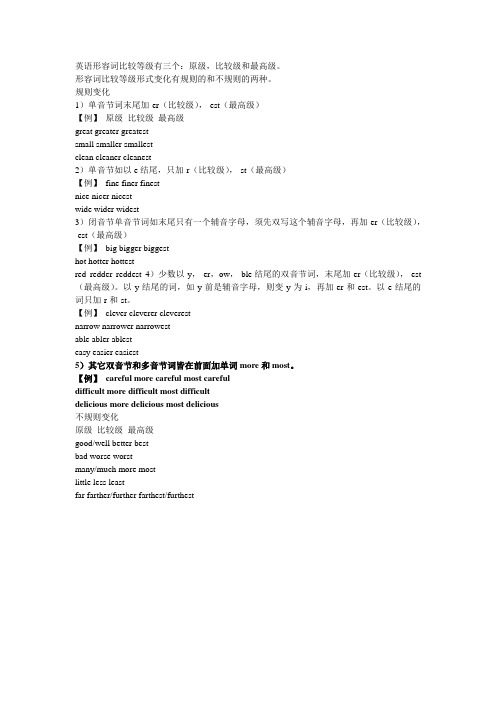
英语形容词比较等级有三个:原级,比较级和最高级。
形容词比较等级形式变化有规则的和不规则的两种。
规则变化1)单音节词末尾加-er(比较级),-est(最高级)【例】原级比较级最高级great greater greatestsmall smaller smallestclean cleaner cleanest2)单音节如以e结尾,只加-r(比较级),-st(最高级)【例】fine finer finestnice nicer nicestwide wider widest3)闭音节单音节词如末尾只有一个辅音字母,须先双写这个辅音字母,再加-er(比较级),-est(最高级)【例】big bigger biggesthot hotter hottestred redder reddest 4)少数以-y,-er,ow,-ble结尾的双音节词,末尾加-er(比较级),-est (最高级)。
以-y结尾的词,如-y前是辅音字母,则变y为-i,再加-er和-est。
以-e结尾的词只加-r和-st。
【例】clever cleverer cleverestnarrow narrower narrowestable abler ablesteasy easier easiest5)其它双音节和多音节词皆在前面加单词more和most。
【例】careful more careful most carefuldifficult more difficult most difficultdelicious more delicious most delicious不规则变化原级比较级最高级good/well better bestbad worse worstmany/much more mostlittle less leastfar farther/further farthest/furthest。
比较级
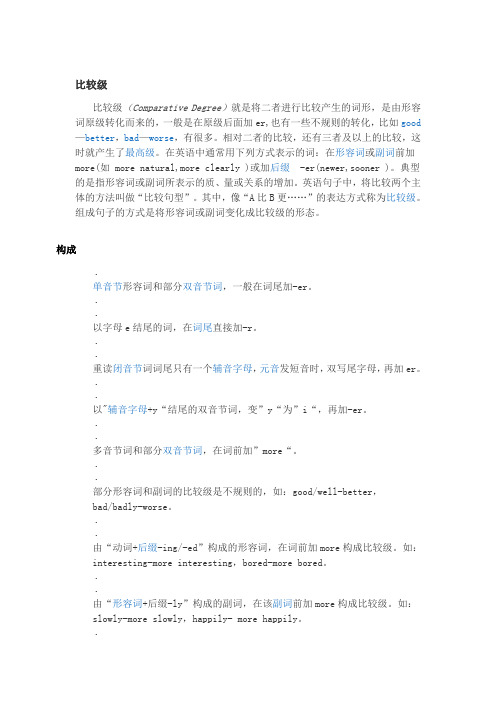
比较级比较级(Comparative Degree)就是将二者进行比较产生的词形,是由形容词原级转化而来的,一般是在原级后面加er,也有一些不规则的转化,比如good —better,bad—worse,有很多。
相对二者的比较,还有三者及以上的比较,这时就产生了最高级。
在英语中通常用下列方式表示的词:在形容词或副词前加more(如 more natural,more clearly )或加后缀-er(newer,sooner )。
典型的是指形容词或副词所表示的质、量或关系的增加。
英语句子中,将比较两个主体的方法叫做“比较句型”。
其中,像“A比B更……”的表达方式称为比较级。
组成句子的方式是将形容词或副词变化成比较级的形态。
构成.单音节形容词和部分双音节词,一般在词尾加-er。
..以字母e结尾的词,在词尾直接加-r。
..重读闭音节词词尾只有一个辅音字母,元音发短音时,双写尾字母,再加er。
..以"辅音字母+y“结尾的双音节词,变”y“为”i“,再加-er。
..多音节词和部分双音节词,在词前加”more“。
..部分形容词和副词的比较级是不规则的,如:good/well-better,bad/badly-worse。
..由“动词+后缀-ing/-ed”构成的形容词,在词前加more构成比较级。
如:interesting-more interesting,bored-more bored。
..由“形容词+后缀-ly”构成的副词,在该副词前加more构成比较级。
如:slowly-more slowly,happily- more happily。
.用法一般1. 表示"比...更"。
用比较级形容词+than+比较成分, than后主词的述语动词往往省略, 非正式用法的than后的人称代名词可用宾格。
He is younger than me.他比我年轻。
I am a better swimmer than he(him).我游泳比他好。
(完整版)英语单词比较级
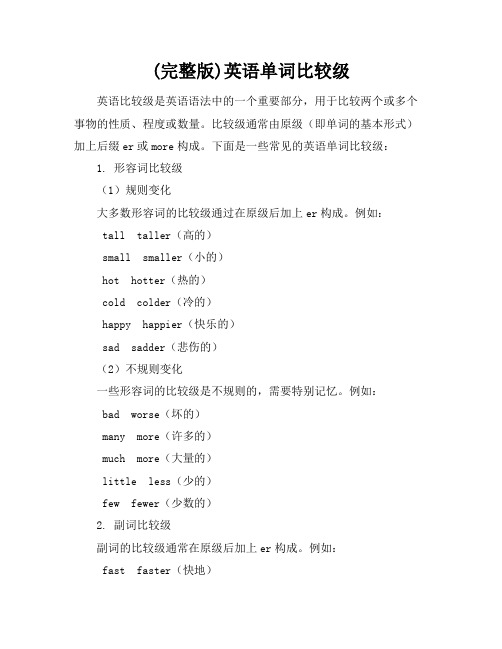
(完整版)英语单词比较级英语比较级是英语语法中的一个重要部分,用于比较两个或多个事物的性质、程度或数量。
比较级通常由原级(即单词的基本形式)加上后缀er或more构成。
下面是一些常见的英语单词比较级:1. 形容词比较级(1)规则变化大多数形容词的比较级通过在原级后加上er构成。
例如:tall taller(高的)small smaller(小的)hot hotter(热的)cold colder(冷的)happy happier(快乐的)sad sadder(悲伤的)(2)不规则变化一些形容词的比较级是不规则的,需要特别记忆。
例如:bad worse(坏的)many more(许多的)much more(大量的)little less(少的)few fewer(少数的)2. 副词比较级副词的比较级通常在原级后加上er构成。
例如:fast faster(快地)slowly more slowly(慢地)carefully more carefully(仔细地)well better(好地)badly worse(坏地)3. 比较级的用法(1)形容词和副词的比较级通常与than连用,构成比较句。
例如:He is taller than me.(他比我高。
)She runs faster than him.(她比他跑得快。
)(2)在比较级前可以使用一些修饰词,如a little, much, far 等,表示比较的程度。
例如:This book is a little more interesting than that one.(这本书比那本更有趣。
)She sings much better than her sister.(她唱歌比她姐姐唱得好多了。
)She is the tallest girl in our class.(她是我们班最高的女孩。
)He runs the fastest in our school.(他是我们学校跑得最快的。
比较级的结构和用法
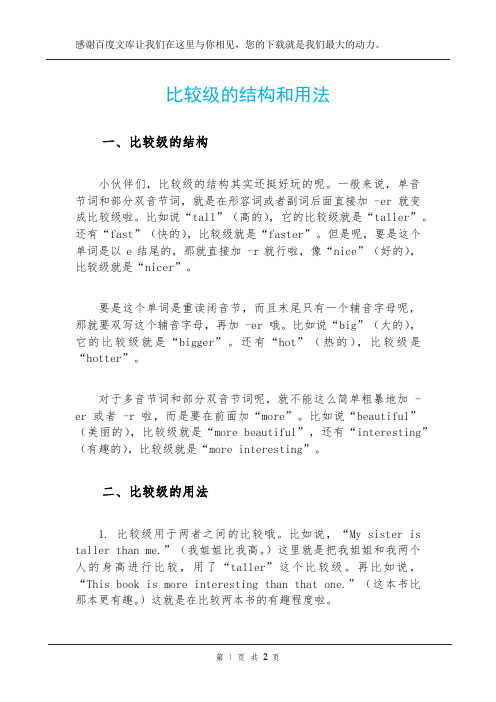
比较级的结构和用法一、比较级的结构小伙伴们,比较级的结构其实还挺好玩的呢。
一般来说,单音节词和部分双音节词,就是在形容词或者副词后面直接加 -er就变成比较级啦。
比如说“tall”(高的),它的比较级就是“taller”。
还有“fast”(快的),比较级就是“faster”。
但是呢,要是这个单词是以e结尾的,那就直接加 -r就行啦,像“nice”(好的),比较级就是“nicer”。
要是这个单词是重读闭音节,而且末尾只有一个辅音字母呢,那就要双写这个辅音字母,再加 -er哦。
比如说“big”(大的),它的比较级就是“bigger”。
还有“hot”(热的),比较级是“hotter”。
对于多音节词和部分双音节词呢,就不能这么简单粗暴地加 -er或者 -r啦,而是要在前面加“more”。
比如说“beautiful”(美丽的),比较级就是“more beautiful”,还有“interesting”(有趣的),比较级就是“more interesting”。
二、比较级的用法1. 比较级用于两者之间的比较哦。
比如说,“My sister is taller tha n me.”(我姐姐比我高。
)这里就是把我姐姐和我两个人的身高进行比较,用了“taller”这个比较级。
再比如说,“This book is more interesting than that one.”(这本书比那本更有趣。
)这就是在比较两本书的有趣程度啦。
2. 比较级还可以和“than”搭配使用,这是比较常见的用法。
不过呢,有时候也可以不用“than”,而是通过上下文来体现比较的关系。
就像“He is stronger. I can't beat him.”(他更强壮,我打不过他。
)这里虽然没有“than”,但是我们也能知道是在把“他”和“我”进行比较。
3. 在一些句子里,比较级还可以表示“越来越……”的意思呢。
比如说,“It is getting colder and colder.”(天气变得越来越冷了。
比较级和最高级用法
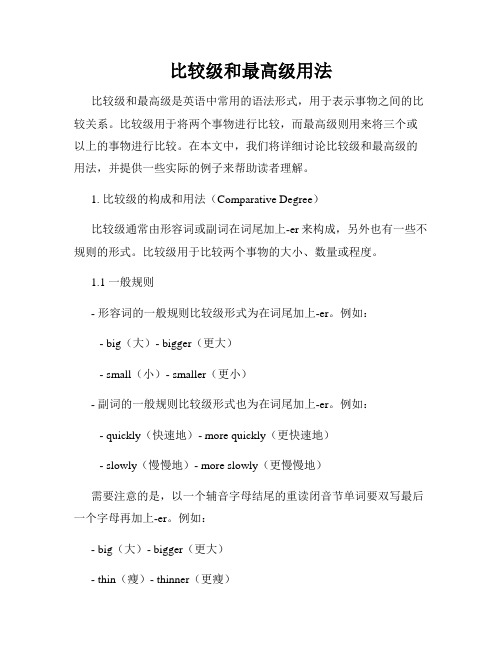
比较级和最高级用法比较级和最高级是英语中常用的语法形式,用于表示事物之间的比较关系。
比较级用于将两个事物进行比较,而最高级则用来将三个或以上的事物进行比较。
在本文中,我们将详细讨论比较级和最高级的用法,并提供一些实际的例子来帮助读者理解。
1. 比较级的构成和用法(Comparative Degree)比较级通常由形容词或副词在词尾加上-er来构成,另外也有一些不规则的形式。
比较级用于比较两个事物的大小、数量或程度。
1.1 一般规则- 形容词的一般规则比较级形式为在词尾加上-er。
例如:- big(大)- bigger(更大)- small(小)- smaller(更小)- 副词的一般规则比较级形式也为在词尾加上-er。
例如:- quickly(快速地)- more quickly(更快速地)- slowly(慢慢地)- more slowly(更慢慢地)需要注意的是,以一个辅音字母结尾的重读闭音节单词要双写最后一个字母再加上-er。
例如:- big(大)- bigger(更大)- thin(瘦)- thinner(更瘦)有一些形容词及副词的比较级形式是不规则的,需要单独记忆。
例如:- good(好)- better(更好)- bad(坏)- worse(更坏)- far(远)- further/farther(更远)1.3 比较级的用法- 比较级可用于句子中直接进行比较。
例如:- This book is longer than that one.(这本书比那本书长。
)- She runs faster than her brother.(她跑得比她哥哥快。
)- 比较级还可用于表示一个事物在某个特定方面的优势。
例如:- This car is cheaper to maintain than the previous model.(这辆车在维护方面比上一款便宜。
)- He is taller than most of his classmates.(他比大部分同学都高。
形容词和副词有三个比较等级
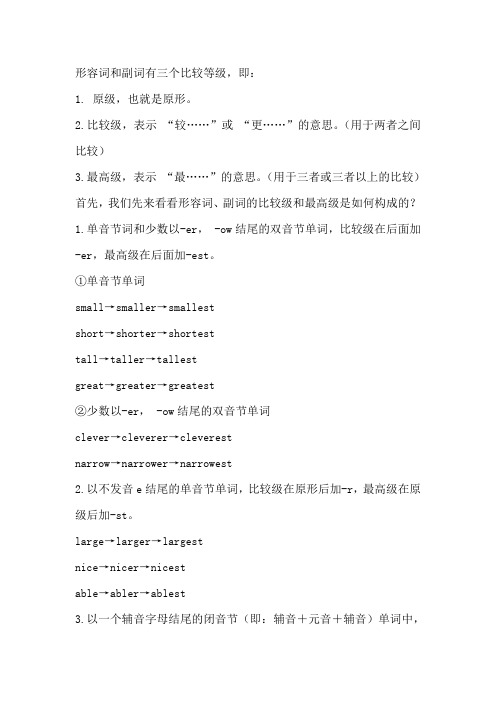
形容词和副词有三个比较等级,即:1. 原级,也就是原形。
2.比较级,表示“较……”或“更……”的意思。
(用于两者之间比较)3.最高级,表示“最……”的意思。
(用于三者或三者以上的比较)首先,我们先来看看形容词、副词的比较级和最高级是如何构成的?1.单音节词和少数以-er, -ow结尾的双音节单词,比较级在后面加-er,最高级在后面加-est。
①单音节单词small→smaller→smallestshort→shorter→shortesttall→taller→tallestgreat→greater→greatest②少数以-er, -ow结尾的双音节单词clever→cleverer→cleverestnarrow→narrower→narrowest2.以不发音e结尾的单音节单词,比较级在原形后加-r,最高级在原级后加-st。
large→larger→largestnice→nicer→nicestable→abler→ablest3.以一个辅音字母结尾的闭音节(即:辅音+元音+辅音)单词中,先双写末尾的辅音字母,比较级加-er,最高级加-est。
big→bigger→biggesthot→hotter→hottestfat→fatter→fattest4.以“辅音字母+y”结尾的双音节词,把y改为i,比较级加-er,最高级加-est。
easy→easier→easiestheavy→heavier→heaviestbusy→busier→busiesthappy→happier→happiest5.其他双音节词和多音节词,比较级在前面加more,最高级在前面加most。
beautiful→more beautiful→most beautifuldifferent→more different→most differenteasily→more easily→most easily6.有少数形容词、副词的比较级和最高级是不规则的,必须熟记。
英语单词比较级
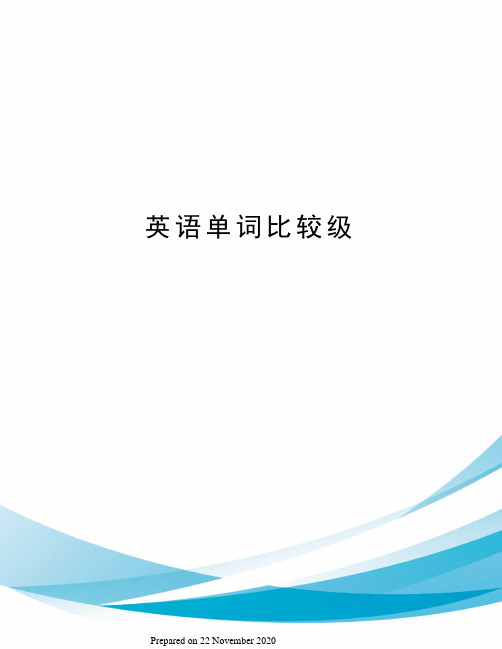
英语单词比较级英语比较级总汇大:big-bigger-biggest 小:small-smaller-smallest大:large-larger-largest 聪明:smart-smarter- smartest明亮:bright-brighter-brightest 昏暗:dark-darker-darkest 快:fast-faster-fastest 慢: slow-slower-slowest热:hot-hotter-hottest 冷: cold-colder-coldest容易:easy-easier-easiest 难: hard-harder-hardest重:heavy-heavier-heaviest 轻:light-lighter-lightest快乐:happy-happier-happiest 远:far-farther-farthest 早:early-earlier-earliest 迟:late-later-latest干净:clean-cleaner-cleanest 脏:dirty-dirtier-dirtist干燥:dry-drier-driest 潮湿:wet-wetter-wettest新的:nice-nicer-nicest 宽:wide-wider-widest 好:good-better-best 好:well-better-best坏:bad-worse-worst 新:new-newer-newest许多:many/much-more-most 少:little-less-least老:old-older-oldest 年轻:yong-yonger-yongest短:short-shorter-shortest 长:long-longer-longest低:low-lower-lowest 高:tall-taller-tallest瘦:thin-thinner- thinnest 胖:fat-fatter-fattest高(身高):High-higher-highest 忙:busy-busier-busiest虚弱:weak-weaker-weakest 强壮:strong-stronger-strongest 友好:friendly---more friendly---the most friendly有趣:interesting---more interesting-- -the most interesting 小心:carefully---more carefully- --the most carefully重要:important-- more important--- the most important漂亮:beautiful- -more beautiful-- the most beautiful。
比较级
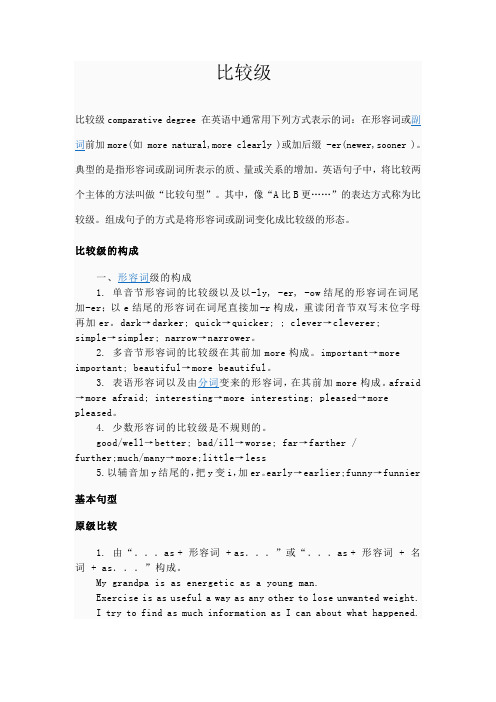
比较级比较级comparative degree 在英语中通常用下列方式表示的词:在形容词或副词前加more(如 more natural,more clearly )或加后缀 -er(newer,sooner )。
典型的是指形容词或副词所表示的质、量或关系的增加。
英语句子中,将比较两个主体的方法叫做“比较句型”。
其中,像“A比B更……”的表达方式称为比较级。
组成句子的方式是将形容词或副词变化成比较级的形态。
比较级的构成一、形容词级的构成1. 单音节形容词的比较级以及以-ly, -er, -ow结尾的形容词在词尾加-er;以e结尾的形容词在词尾直接加-r构成,重读闭音节双写末位字母再加er。
dark→darker; quick→quicker; ; clever→cleverer;simple→simpler; narrow→narr ower。
2. 多音节形容词的比较级在其前加more构成。
important→more important; beautiful→more beautiful。
3. 表语形容词以及由分词变来的形容词,在其前加more构成。
afraid →more afraid; interesting→more interesting; pleased→more pleased。
4. 少数形容词的比较级是不规则的。
good/well→better; bad/ill→worse; far→farther /further;much/many→more;little→less5.以辅音加y结尾的,把y变i,加er。
early→earlier;funny→funnier 基本句型原级比较1. 由“...as + 形容词 + as...”或“...as + 形容词 + 名词 + as...”构成。
My grandpa is as energetic as a young man.Exercise is as useful a way as any other to lose unwanted weight.I try to find as much information as I can about what happened.2. 由“...not so (as) + 形容词 + as...”或“...not so (as) + 形容词 + 名词 + as...”构成。
- 1、下载文档前请自行甄别文档内容的完整性,平台不提供额外的编辑、内容补充、找答案等附加服务。
- 2、"仅部分预览"的文档,不可在线预览部分如存在完整性等问题,可反馈申请退款(可完整预览的文档不适用该条件!)。
- 3、如文档侵犯您的权益,请联系客服反馈,我们会尽快为您处理(人工客服工作时间:9:00-18:30)。
没有比较级、最高级的形容词和副词英语中,有些形容词和副词没有比较等级,这主要是由于本身词义的缘故,在语义上不存在差别,这类词可称为不可分级形容词或副词。
主要有下列几类:1、本身就有比较级含义的词:senior年长的、较高的,junior年少的、较低的,prior在先的,anterior前面的,inferior次于、下等的,superior优于、上等的,posterior以后的,major主要的,minor次要的、较小的。
在使用这些词时无须加more,也不能和than连用,而要用介词to引出比较对象(这种表示法也称为拉丁比较级)。
例如:Thissocial system is super or than that system. 这种社会制度比那种优越。
He issenior to me by several years . 他比我大几岁。
Hismethod of doing reserach work is hardly appreciated ;he feels inferior toothers. 他做研究的方法没人欣赏;他感到比别人矮了一截。
2、表示状态或情况的词:afriad害怕的,asleep睡着的,alive活着的,alike相象的,awake醒着的,alone单独的,aware意识到的,ablaze着火的,adrift漂流的,afire燃烧着的,astray迷途,aghast惊呆的,ashamed羞耻的,alight照亮,astire 引动起来,afoot活动着的,ashore在岸上的,agape目瞪口呆,awerse不乐意的,afloat浮着。
3、表示形状的词;round圆形的,circular圆形的,oval椭圆形的,square方形的,oblong长方形的,angular角形的,level水平的,horizontal水平的。
4、表示物质特征的词;atomic原子的,solar太阳的,physical物理的,organic有机的,economic 经济的,sonic声音的,scientific科学的,wooden木制的,earthen泥土的,golden黄金般的,woolen羊毛的,bronze青铜的,silver银制的。
5、表示方位处所、时间的词:east东方的,west西方的,south南方的,north北方的,ahead在前面,front 前面的,back后面的,left左侧的,right右边的,now现在,past过去的,future将来的,today当今的,then当时,present目前的。
6、表示强调的词:right恰好,very非常,just正好,own自己的,simply简单的,favourite 最喜爱的,hardly简直不,barely赤裸裸的。
7、表示大小、极限、先后顺序、是非的词:maximum最大的,minimum最小的,utmost最远的,extremely极端的,first首先的,last最后,,right对的,wrong错误的,true真的,false假的。
8、表示国籍的词:Chinese中国的,Japanese日本的,Indian印度的,Italian意大利的,Australian 澳大利亚的,English 英国的,Russian 俄罗斯的,American 美国的,Canadian 加拿大的。
9、表示独一无二的词:unique 唯一的,only唯一的,single 仅一个的,matchless 无比的。
sheer 绝对的,sole单独的,universal宇宙的,invincible战无不胜的。
10、表示“特殊”“比较”意义的词:particular(ly)特殊的(地),special(ly) 特殊的(地),especial(ly) 特别、尤其,relative(ly) 相对的11、表示“绝对”意义的词:absolutely(ly)绝对,entire(ly)完全,whole (wholly)全部,complete(ly) 完整,thorough(ly) 彻底,total(ly)全部,perfect(ly)完美,excellent(ly)极好,wonderful极好的,marvelous极妙的,incredible不可相信的。
12. limit adjective(极限形容词)极限形容词是指本身就表达一个绝对、极端意义的形容词。
此类形容词通常不能用于比较级和最高级。
属于该类的常见形容词有:perfect, unique, impossible, worthless, speechless, empty, full, disgusting, amazed, terrific, marvelous, excellent, exhausted, inferior等等。
但这些词前却可以带诸如absolutely, completely, quite, totally, utterly等的程度副词作修饰语,表示最高的程度;还可带有诸如almost, nearly, practically, virtually 等程度副词,表示接近最高的程度之意。
13. non-gradable adjectives(非程度形容词)此类形容词不能表示"程度"的不同,只可表"是"与"非"。
如,married(已婚)一词,我们不能说一个人"more married"或"less married",属于该类的常见形容词有:1)表示国籍的形容词,如Chinese, British, American, Spanish 等等;2)表示颜色的形容词,如red, blue, yellow等;3)表示方向、方位的形容词,如northern, southern, eastern, western, middle, right, left, outdoor, indoor, 等等;以及其它像monthly, weekly, yearly, daily, atomic, painted, electric等等很多有"concerning...", "about"意义的形容词,一般都不可用于比较级和最高级。
但是,没有比较级这不是绝对的。
例如有人就会说:(1)Your brother is more right than you seem to realize.你弟弟要比你似乎所认为的更正确。
(2)You are younger and your digestion should be more perfect.你年轻,你的消化力应该比较强。
没有比较级、最高级的形容词列表(非全部)A· abnormally· above· absent· absolute· abusive· achievable· acidic· acoustic· actual· additional· adja cent·Template:adjective·advertisable·advertizable·aerobic·Afghan·afloat·afoot·all right· alphabetical· alright· amicable· amphibious· analog· androgynous· annual· antiquarian· antiq ue· anxious· Arab· arbitrary· archaeological· Argentine· Argentinian· arrivable· assistant· assured· a symmetrical· at stake· atomic· audio· authentic· automaticB· baggy· bananas· banging· bankrupt· bedroomed· bicolour· Biedermeier· blanket· blazed· bloomin g· bound· brilliant· brimstone· brunet· brunette· brute· bully· buttonlessC· Canadian· capillary· capital· careful· careless· CatholicC cont.· catholic· champion· chemical· chicken· chief· childless· Chilean· chocolate· chosen· Christian· cir cular· class· closed· cognate· columnar· complicated· consequent· constituent· constructive· consumed·contiguous·continuous·copper·countable·counterfeit·courageous·crash· Help:Creating a new entry/Example adjective entry 2· Creek· crowning· cutD· daily· damn· decimal· designed· digital· dignified· disadvantaged· disgraced· distraught· dormant·double· dual· due· dummy· dwarfE ·earthen·editable·effortless·electric·electronic·elegant·emotional·en travesti· entire· envious· ephemeral· equal· equestrian· especial· eventual· everyday· extant· extinct·extra· extracurricularF· fabulousF cont.· faint· fashionable· fastidious· fatal· favorite· fellow· female· fifth· filial· financial· first· floral· fluf fy· fluttering· fluvial· fogless· foolish· former· fourth· freeborn· freshwater· front· fucking· futureG· gasiform· genital· giant· glacial· gone· granted· graphic· ground· grubby· grumpyH· halfway· harsh· heliocentric· herbal· hermaphroditic· heterosexual· homesick· homogeneous· hon orary· horny· horrendous· hourly· how· hugeI· identical· imaginary· immortal· impolite· impregnable· inadequate· inclined· inconclusible· increa sing· incumbent· incurable· indefinite· indestructible· indigo· inedible· inevitable· inferior· influenti alI· inherent· initial· inland· innate· insignificant· intact· intersexual· interurban· invalid· invisible· inv oluntary· irrespective· irreversible· ItalicJ· jawed· jealous· joblessL· laden· laissez-faire· lamentable· landlocked· last· Latin· latter· leeward· left· lesbian· likeable· lilli putian· linguolabial· lithe· littoral· live· loaded· locked· lone· lowercase· lunarM· magnetic· main· majestic· male· malformed· malleable· man-made· manuscript· Marathi· maritim e· married· maternal· mechanical· medieval· medium· mere· merest· method· microwavable· micro waveable· mid· midland· miniature· minimal· minus· miserable· mistaken· mock· modestM cont.· modular· molecular· monotheistic· mortal· mossless· Muslim· muteN·naked·naval·neighboring·neighbouring·Template:new adjective· next· Nipponese· nomadic· non-rhotic· nonadjustable· nonobscene· nonstandard· noxious O· obovoid· obpyriform· odorless· odourless· off· ok· okay· on· onboard· online· only· operational· o ptional· orchestral· ordinal· other· outdoor· overland· overnight· overseas· ownP· pagan· parallel· parental· past· paternal· pending· penultimate· perennial· permeable· perpendicula r· personal· Pichileminian· picturesque· platinum· plumb· plural· poisonless· posthumous· potential · pounded· powerless· practicing· preoccupied· preparatory· pretend· previousP cont.· primary· prime· principal· prior· progressive· prohibited· prominentQ· quadrennial· quality· quarterlyR· radioactive· rash· raven· reflexive· regulation· remediless· representative· resident· reusable· rever sible· rigorousS· saccharine· said· saline· same· sarcastic· scalar· scarce· second· semantic· separate· serrated· sessil e· set· seventh· sheer· simultaneous· Sindhi· single· sixth· slippery· snakeless· so-called· solar· soph omore·Spanish·spent·standing·stationary·stirring·stock·strapped·strategical·strawberry blond·stringed·sub rosa· subsequent· subtle· suburban· successive· such· super· superb· supercalifragilisticexpialidocio us· supernatural· supposedS· swellable· swift· symmetrical· synonymous· syntacticallyT· tame· tarnish· teenage· telling· temperate· temporary· tentative· tenth· terminal· theoretical· third· t hird-person· thirteen· thoughtful· token· total· transgendered· translational· translationless· transpho bic· treachery· treeless· tricolorT cont.· true blue· twelfthU· unable· unachievable· unadapted· unafraid· unaided· unanimous· unassessed· unaware· unbaked·unbearable· unborn· unconscious· unconstrained· uncooked· uncountable· undead· undocumented·unflavored· unflavoured· unformed· united· unlike· unlimited· unlocked· unnamed· unpleasantU cont.· unsaturated· unsigned· untrue· unwise· up· upper· upside down· usual· utterlyV· vacant· verbal· very· Victorian· vigorousW· wanting· water-proof· weightlessness· what· whatsoever· Wiccan· wicked· windward· worthless·writtenX· X-rayY· yearly· youngish。
